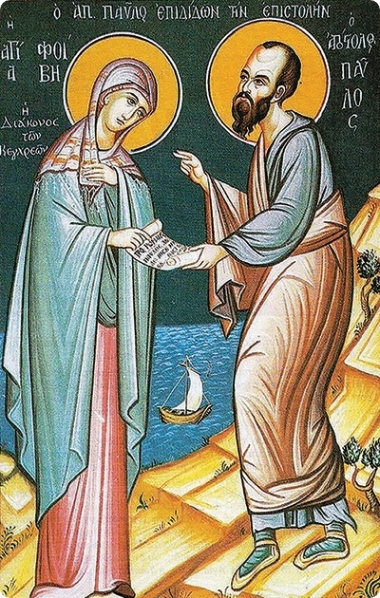‘Help her, who has been a patron to me’

I commend to you Phoebe our sister, who is [also] a minister [diakonos] of the church at Cenchreae, that you may receive her in the Lord in a manner worthy of the holy ones, and help her in whatever she may need from you, for she has been a benefactor to many and to me as well. (Romans 16:1-2)
Four years ago I heard these verses from St. Paul’s Letter to the Romans, Chapter 16 for the first time.
It was on a Thursday night in early September, when thunderstorms dominate Durham afternoons. I was sure that the parish trailer we used for meetings at Immaculate Conception would be empty. As we got near to 7pm, people came in dripping wet, and we kept adding chairs to the semicircle until 40 or so folks filled the room.
Luke Hansen proclaimed the scripture, and helped set the context: the early church had women deacons; women that have always been a part of Jesus’ ministry; the changing roles of women in society and in the church; a papal commission underway considering whether now might be a time to restore this ministry for women.
Then I shared my own story. It felt a little risky – a taste of what some might feel as they come out to their church community. Will they think I’m being unfaithful? Will they receive me? Will they look at me differently, now that I’ve shared this quiet prayer for women to be restored to the diaconate that had been turning over in my heart?
A I looked out and saw priests I worked with daily respond to my testimony with encouragement. I saw my supervisor, a dedicated woman in ministry for over 40 years, with tears in her eyes and a lament from deep in her spirit swirling up close to the surface. I saw young women studying theology listen with suspicion, hesitant to be hopeful. I saw men, discerning their own diaconal vocations, thinking about their own privilege and grappling with how to be in solidarity as they seek to serve Jesus with their whole hearts.
I didn’t know who St. Phoebe was.
I didn’t know she had a feast day or was celebrated in a beautiful, solemn, Orthodox liturgy. I didn’t know that Origin and St. John Crystostom referenced her as one of the reasons justifying women serving as deacons in their own time.
I did know that I was not as alone as I thought I was.
St. Phoebe’s Feast day is drawing close. A time to bring to mind all those in our own path who have been the face of Jesus, the one who came to serve and not to be served. And to ponder anew: what does it mean that Phoebe was a benefactor to St. Paul? What might it mean that he tells others to help her, with whatever she requires of them?
How might we be compelled, this next year, to help St. Phoebe? What does she ask of us? How does she invite us to proclaim the Good News? Who does she want you to encounter? How is she nudging you to serve, and be generous? And where is she standing on the threshold, distributing the gifts that are being poured out in abundance, in order to help the Church minister to everyone’s needs and to be a place of welcome for all?
Perhaps you’ll join us for our virtual liturgy on Saturday, September 3 – it will be different from last year’s, and from our inaugural gathering in 2020.
For the first time, some of us will be gathering in person at the Basilica of Our Lady of Guadalupe in Mexico City. Walking together, singing, breaking bread, celebrating Mass. And at 8:30 pm ET we’ll fire up the zoom connection and invite you to join us as we pray, as we share our stories, as we seek out the intercession of St. Phoebe together with Our Lady of Guadalupe, all those deacons and saints who have gone before us – knowing again that we do not walk alone.

